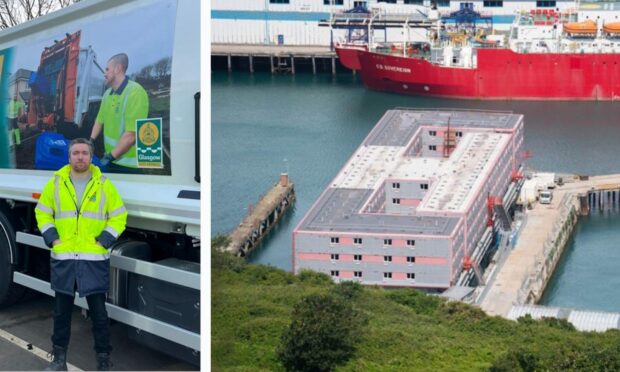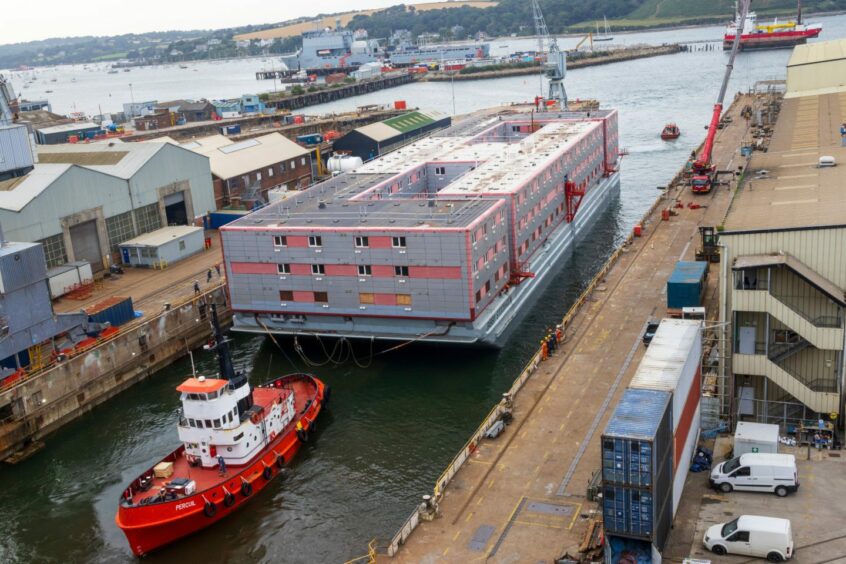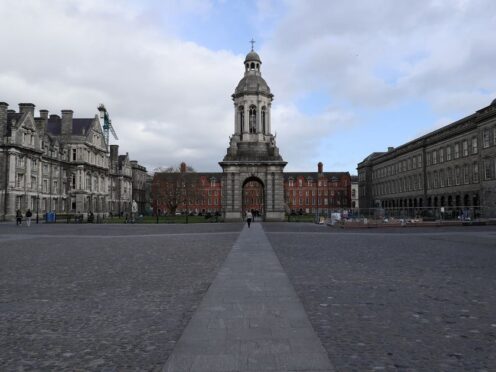“It essentially will be a prison – it’ll feel that way anyway.
“Obviously, they will try and dress it up as people are free to come and go as they want.
“But, it’s the illusion of freedom, rather than the reality of it.”
Former oil worker Ruairi Kelly has revealed what it was like to live on Bibby Stockholm, the controversial barge being used to house asylum seekers in Dorset.
The UK Government hopes the vessel will help slow down the number of migrants crossing the English Channel, but critics say it is cruel and inhumane.
The first group of asylum seekers boarded the barge on Monday, despite further concerns being raised over fire safety and overcrowded living conditions.
The “Bibby Stockholm” floating barge is a shameful way to receive people who’ve fled conflict and persecution.
The UK Government must stop its terrible treatment of people seeking asylum. pic.twitter.com/E2pWoGeEG2
— Amnesty International (@amnesty) August 8, 2023
Ruairi was one of the hundreds of workers who stayed there in Lerwick in 2013 during the construction of the Shetland Gas Plant.
The Glasgow councillor said while it “wasn’t the worst experience” for him, he realises the circumstances are completely different.
Reflecting on his time on the barge, Mr Kelly said: “I was getting paid, and going home after three weeks – and you were only on it for a short period of time to eat and sleep.
“If the circumstances were different and you were on it indefinitely with no ability to work, no money, couldn’t get off and do anything it would have been much more unpleasant.”
Barge to house 500 male asylum seekers
Mr Kelly said no one shared rooms, and even if they did they would be people working different shifts so it would only be one person in the room at a time.
There were also only around 200 to 250 people on the boat at one time making meal times easier and recreational rooms less crowded and noisy.
Rooms are around 12ft by 12ft, tight narrow corridors with low ceilings, and not a huge deal of light in the rooms – with some facing inwards getting no sunlight at all.
However, the plan now is to house 500 male asylum seekers on the barge at a time, with two to a room.
The capacity was increased through the installation of bunk beds and restriction of some recreational areas.
The SNP councillor believes this overcrowding will put “stress” on people who have already suffered traumatic experiences.
He said: “But, 500 people on it, all coming from potentially traumatic backgrounds and circumstances themselves from all over the world would be hugely different to what we experienced on it.
“I imagine that would put a lot of stress on people who have already suffered traumatic experiences and are dealing with their own mental and physical health issues.
“It is not supposed to be welcoming, that’s the whole point.”
The Home Office says the barge will provide better value for the taxpayer as pressure on the asylum system from small boat arrivals continues to grow.
It is the first barge secured under the government’s plans to reduce the cost of asylum accommodation.
People could be on Bibby Stockholm for over a year
Some people may end up living on the barge for up to three years as their request is processed.
This comes following reports of asylum seekers living in hotels for over a year while their request is processed – which is thought to cost the public purse around £6 million a day.
While people can leave the barges, they are unable to work and have no money to do anything.
Mr Kelly has described it as an “open prison” because people will be forced to stay onboard, whereas those in hotels will have more freedom to move around in a town or city.
He finished: “At least if you’re in a hotel, maybe in a town or city, you would have more freedom to move around.
“Whereas in a fenced-off bit of a harbour – even if they do put on shuttle buses – it’s essentially an open prison floating in the water.”
UK government: ‘This is a tried and tested approach’
According to the UK government facilities onboard the vessel have been designed to provide for the essential needs of those accommodated in order to minimise the impact on local communities and local services.
This includes the provision of basic healthcare, catering facilities and 24/7 security.
The Bibby Stockholm vessel has been used for decades to provide safe and decent accommodation to oil rig workers and was used between 1995 to 1998 to accommodate refugees in Germany.
It will be in place initially for 18 months but kept under review.
A Home Office spokesman said: “The first asylum seekers are now being housed on the vessel in Portland after it successfully completed all health, fire and safety checks.
“The number of people on board will increase gradually with more arrivals later this week and in the coming months, as part of a carefully structured phased approach.
“This marks a further step forward in the government’s work to bring forward alternative accommodation options as part of its pledge to reduce the use of expensive hotels and move to a more orderly, sustainable system which is more manageable for local communities.
“This is a tried and tested approach that mirrors that taken by our European neighbours, the Scottish Government and offers better value for the British taxpayer.”














Conversation